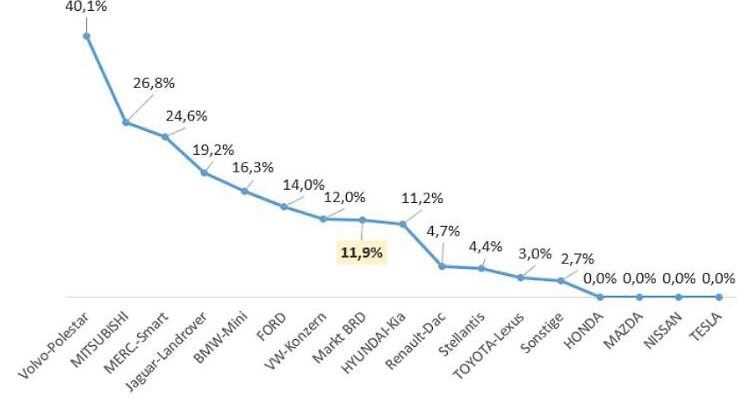Tuesday, October 19, 2021
New edition of the electric subsidy
Tesla could become the traffic light winner
By Diana Dittmer
The promotion of e-cars using the watering can principle should soon be a thing of the past. If partially-electric hybrid vehicles were excluded from government subsidies, that would be consistent and sensible. The German carmakers would have to cope with a setback in the middle of the race to catch up.
So far, both buyers of an electric car and buyers of a partially electric vehicle can look forward to rich environmental bonuses. The federal government supports the purchase of a purely electric car with up to 6,000 euros. A partially electric vehicle, a so-called plug-in hybrid, is still subsidized with up to 4,500 euros. It is a foregone conclusion that the possible traffic light government made up of the SPD, Greens and FDP wants to turn this regulation. The only question is: how radically will the bonus system be changed, and what are the consequences for the auto industry?
The CAR Center Automotive Research ran through the scenario that the funding of partially electric plug-ins will be completely canceled. State bonuses for vehicles that do not necessarily have to drive electrically and that are electrically operated only have a very small radius are a thorn in the side of both the FDP and the Greens.
This has to do with the fact that subsidies based on the watering can principle are on the one hand ineffective when it comes to keeping an eye on a black household zero. On the other hand, subsidies for only partially electric vehicles are difficult to convey to taxpayers. The reporting of charging cables in their original packaging when leased company vehicles are returned has had an impact on the public.
According to calculations by the institute director Ferdinand Dudenhöffer, around 240,000 new plug-in hybrid vehicles were bought and subsidized in Germany in the first nine months of the current year. As a result, the state treasury was burdened with just under a billion euros. Extrapolated over twelve months, it will even be well over a billion euros. The Ampel coalitionists could save the money in the future.
The previous government did not intend to go that far. According to a draft of the Federal Ministry of Economics, which is still led by the CDU, for a new funding guideline, which got through at the beginning of the month, plug-in hybrid cars should continue to receive funding in the future. The subsidies should only be linked to new conditions, for example premiums should only be paid if the carmaker would increase the electrical radius.
The losers are automakers with many hybrid models
A complete elimination of the environmental bonus for hybrid models – as used in the CAR Institute’s scenario – would have not inconsiderable consequences in the middle of the transformation phase away from the combustion engine and towards electromobility. If you look at the German sales market, such a regulation would hit the Chinese car maker Volvo worst. According to the study, with a share of over 40 percent in this country, he is by far the largest seller of plug-in hybrids. But the German competition is at least in the middle with an average market share for hybrids of 11.9 percent.
After loser number 2 Mitsubishi (26.8 percent hybrid share), the first German car maker to lose out is already in third place with the Mercedes-Smart (24.6 percent). The BMW Mini ranks fifth with 16.3 percent and the VW Group seventh with a 12 percent share of plug-in hybrids in new cars. This means that German car manufacturers have so far benefited disproportionately from the plug-in premium. As a result, they would also feel more of a consequent new regulation.
Green light for Tesla
Conversely, the car manufacturers who build no or hardly any hybrid vehicles would benefit, above all the electric car pioneer Tesla, which produces 100 percent purely electric vehicles. The big profiteers after Tesla would include Hyundai-Kia and Renault-Dacia if hybrid funding were to be completely discontinued.
By canceling the hybrid bonus, the traffic light coalition has the opportunity to accelerate the switch to electric cars in the German car market and at the same time to polish up the state treasury, as the study says. A cancellation of the environmental bonus for hybrid cars also means that “shifts in forces in the German car market” must be expected.
It is basically possible for the losers to catch up. In the future, they will have to compete more for buyers for their subsidized electric vehicles. But car manufacturers who have relied only or largely on fully electric vehicles definitely have a “time advantage”.
A small sales spike for the providers of hybrid models in the last few meters when the hybrid premium expires cannot be ruled out. Many potential buyers who are not yet fully convinced of the electrical technology could now step on the gas and decide to quickly take the bonus with them before it expires.
Either way: “It makes a lot of sense to overturn the government’s green premium for plug-ins,” says the study. “For the FDP and the Greens, the advantages are obvious.” The SPD should also “be able to be convinced”. The dream scenario for the auto expert Dudenhöffer would be if the traffic light coalitionaries would also take the opportunity to address the issue of control equality for petrol and diesel.
